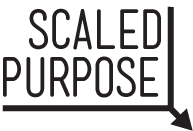Peer-to-Peer Lending and the Future of Cooperation
/Scaled Purpose contributed research and editing to this report authored by Sean Geobey, Assistant Professor, School of Environment, Enterprise and Development, University of Waterloo.
An entrepreneur born in 1990 has grown up in quite a different world than one born in 1960. Imagine a person born in 1960 opening a restaurant in 1985. She would have relied on traditional outlets such as banks, credit unions, and investors for business capital—unless the venture was self- funded. Many industries in 2015 would be mostly unrecognizable to an observer from 1985, from retail to entertainment to travel. The funding industry is no exception. Today’s 25-year-old entrepreneur is living in a new era of lending where traditional institutions are competing with new alternatives. Instead of going to a bank or credit union for business capital, the 25-year-old entrepreneur can turn to online- enabled crowdfunding platforms. These platforms allow large numbers of people, often strangers, to pool their financial resources to achieve common goals and finance everything from new consumer products to feature length films, charitable causes, and, most recently, consumer loans. There are thousands of crowdfunding platforms, each using a unique business model and financing strategy and targeting a different and increasingly specific niche.
In this report we investigate the major providers of peer-based lending and analyze the opportunity for credit unions. This type of lending is between identifiable individuals or businesses and harkens back to the long credit union tradition of reputation- based service delivery. It may present opportunities to extend credit union services to new members and provide alternatives to poor and exploitative options.
Alongside a modernization of and return to core credit union values, the peer-to-peer lending market has major disruptive potential. Online peer-to-peer lending platforms can provide a pipeline to bring in new members who might not otherwise consider a mainstream financial institution as well as a range of new algorithmic tools that can aid in lending decisions.
Full Report is available to Filene Institute Members Only.


